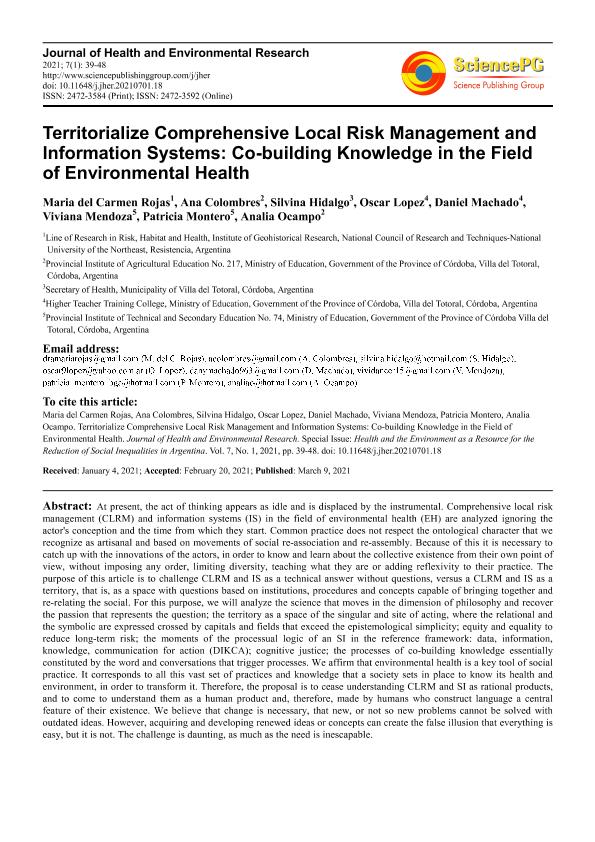Artículo
Territorialize Comprehensive Local Risk Management and Information Systems: Co-building Knowledge in the Field of Environmental Health
Rojas, Maria del Carmen ; Colombres, Edith Liliana
; Colombres, Edith Liliana ; Hidalgo, Silvina; Lopez, Oscar; Machado, Daniel; Mendoza, Viviana; Montero, Patricia Beatriz; Ocampo, Analia Veronica
; Hidalgo, Silvina; Lopez, Oscar; Machado, Daniel; Mendoza, Viviana; Montero, Patricia Beatriz; Ocampo, Analia Veronica
 ; Colombres, Edith Liliana
; Colombres, Edith Liliana ; Hidalgo, Silvina; Lopez, Oscar; Machado, Daniel; Mendoza, Viviana; Montero, Patricia Beatriz; Ocampo, Analia Veronica
; Hidalgo, Silvina; Lopez, Oscar; Machado, Daniel; Mendoza, Viviana; Montero, Patricia Beatriz; Ocampo, Analia Veronica
Fecha de publicación:
09/03/2021
Editorial:
Science Pusblishing Group
Revista:
Journal of Health and Environmental Research
ISSN:
2472-3584
e-ISSN:
2472-3592
Idioma:
Inglés
Tipo de recurso:
Artículo publicado
Clasificación temática:
Resumen
At present, the act of thinking appears as idle and is displaced by the instrumental. Comprehensive local risk management (CLRM) and information systems (IS) in the field of environmental health (EH) are analyzed ignoring the actor´s conception and the time from which they start. Common practice does not respect the ontological character that we recognize as artisanal and based on movements of social re-association and re-assembly. Because of this it is necessary to catch up with the innovations of the actors, in order to know and learn about the collective existence from their own point of view, without imposing any order, limiting diversity, teaching what they are or adding reflexivity to their practice. The purpose of this article is to challenge CLRM and IS as a technical answer without questions, versus a CLRM and IS as a territory, that is, as a space with questions based on institutions, procedures and concepts capable of bringing together and re-relating the social. For this purpose, we will analyze the science that moves in the dimension of philosophy and recover the passion that represents the question; the territory as a space of the singular and site of acting, where the relational and the symbolic are expressed crossed by capitals and fields that exceed the epistemological simplicity; equity and equality to reduce long-term risk; the moments of the processual logic of an SI in the reference framework: data, information, knowledge, communication for action (DIKCA); cognitive justice; the processes of co-building knowledge essentially constituted by the word and conversations that trigger processes. We affirm that environmental health is a key tool of social practice. It corresponds to all this vast set of practices and knowledge that a society sets in place to know its health and environment, in order to transform it. Therefore, the proposal is to cease understanding CLRM and SI as rational products, and to come to understand them as a human product and, therefore, made by humans who construct language a central feature of their existence. We believe that change is necessary, that new, or not so new problems cannot be solved with outdated ideas. However, acquiring and developing renewed ideas or concepts can create the false illusion that everything is easy, but it is not. The challenge is daunting, as much as the need is inescapable.
Archivos asociados
Licencia
Identificadores
Colecciones
Articulos(IIGHI)
Articulos de INST.DE INVEST.GEOHISTORICAS (I)
Articulos de INST.DE INVEST.GEOHISTORICAS (I)
Citación
Rojas, Maria del Carmen; Colombres, Edith Liliana; Hidalgo, Silvina; Lopez, Oscar; Machado, Daniel; et al.; Territorialize Comprehensive Local Risk Management and Information Systems: Co-building Knowledge in the Field of Environmental Health; Science Pusblishing Group; Journal of Health and Environmental Research; 7; 1; 9-3-2021; 39-48
Compartir
Altmétricas



